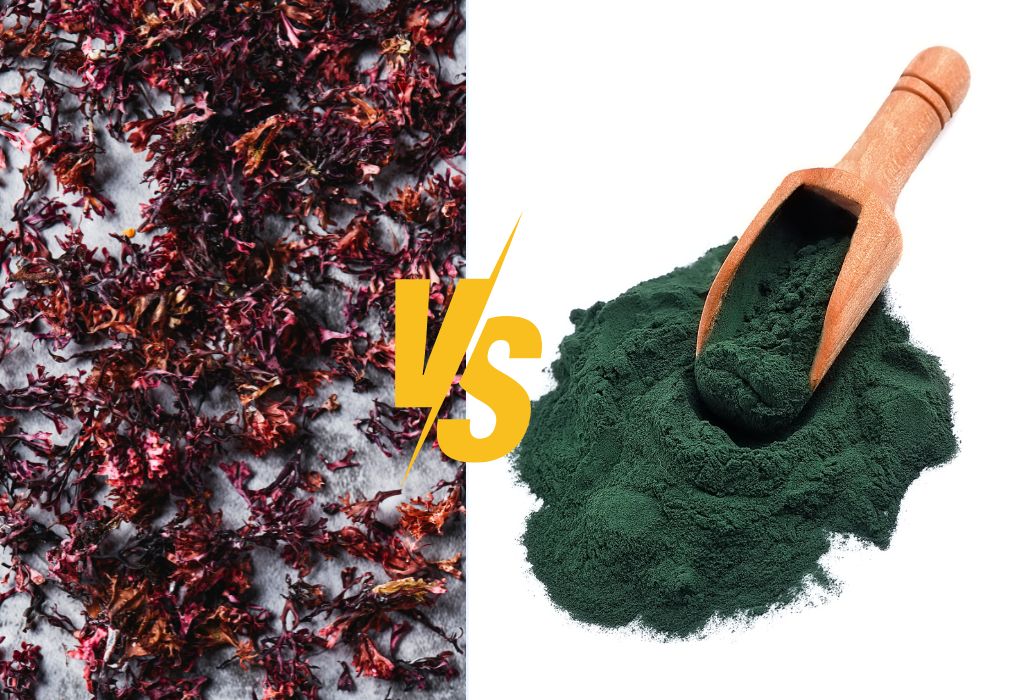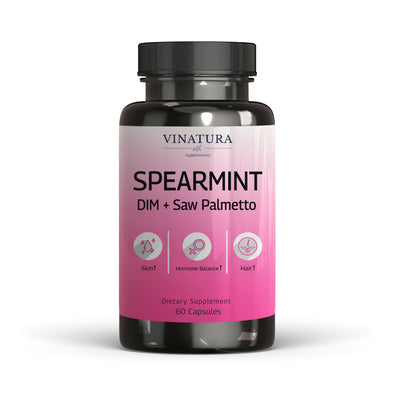
Sea Moss Vs Spirulina: Which Is Better For Health?
Health is crucial for many people aiming to enhance work performance and quality of life. As a result, seeking out superfoods for health has become increasingly popular. Two of the standout options today are Sea Moss and Spirulina. Both are highly nutritious, but they have distinct differences. This article will highlight these differences and suggest which type of food suits each individual.
Before exploring further, please read the disclaimer located at the end of this webpage.
Key Takeaways
- Sea moss suits those needing thyroid health support, while spirulina is ideal for those needing a rich protein boost.
- Sea moss and spirulina can be consumed individually or combined to maximize their nutritional benefits.
- Consider incorporating sea moss and spirulina into your diet through supplements or nutritious smoothie recipes.
- Consult with a healthcare professional before consuming any supplement.
About Sea Moss
Definition and Nutritional Profile of Sea Moss

Sea moss, known as Chondrus crispus, is red algae on the Atlantic coasts. It comes in various colors, such as green, yellow, purple, or red. It is commonly used in traditional Irish and Caribbean medicine.
Sea moss is highly nutritious and is used to boost the immune system, enhance skin health, and slow down oxidative processes. Here is a summary of its nutritional profile:
- Vitamins: Sea moss provides B vitamins (mainly B9 and B12) and is rich in vitamins A, C, D, E, and K.
- Minerals: It contains essential minerals like iron, iodine, phosphorus, magnesium, zinc, and potassium.
- Fiber: Sea moss is high in fiber, supporting digestive health and gut function.
- Fatty Acids: It contains omega-3 and omega-6 fatty acids, which benefit cardiovascular health.
Health Benefits of Sea Moss
Sea moss is often regarded as a superfood with numerous health benefits, such as supporting digestive health, boosting the immune system, enhancing thyroid health, aiding in weight loss, and improving skin health. Specific impacts include:
- Digestive Health: Sea moss's high fiber content and prebiotic properties support gut bacteria growth, aid bowel movement, and reduce constipation.
- Immune Support: Rich in antioxidants and vitamins, sea moss helps combat diseases and infections while boosting the body's natural immune defenses.
- Thyroid Health: Sea moss provides natural iodine, addressing thyroid-related hormone issues and contributing to the body's metabolic regulation.
- Weight Loss: With its rich fiber and nutrients, sea moss helps control appetite, boost metabolism, and manage weight.
- Skin and Hair Health: Sea moss is a good source of plant-based collagen, nourishing and soothing the skin, addressing dryness, flakiness, and skin conditions like psoriasis and acne.
Forms and Ways to Consume Sea Moss
Due to its popularity and health benefits, sea moss is available in various forms, such as raw, gel, powder, capsules, or gummy supplements. Raw sea moss can be soaked, cleaned, and blended into a gel, which can be added to smoothies or dishes. This gel can also be used in topical skin and hair health products.
Understanding Spirulina

Definition and Nutritional Profile of Spirulina
Spirulina is a tiny blue-green alga known as cyanobacteria that can grow in saltwater and freshwater environments. Its nutritional value is well-recognized by research centers and has been utilized since ancient times, starting with the Aztecs.
Like sea moss, spirulina offers a wide range of nutrients, including:
- Protein: Spirulina's protein content makes up 50-70% of its dry weight, providing complete proteins with all essential amino acids.
- Vitamins contain essential vitamins such as vitamin A (beta-carotene), B vitamins (B1, B2, B3, B6, B9, and B12), C, and E.
- Minerals: Spirulina is rich in calcium, potassium, iron, phosphorus, zinc, magnesium, copper, sodium, manganese, and other trace elements.
- Antioxidants: It includes antioxidants like vitamin E, phycocyanin, and zeaxanthin.
Health Benefits of Spirulina
Thanks to its rich nutrient profile, spirulina is a top choice for natural health improvement. It provides a wealth of nutrients supporting cardiovascular, digestive, energy levels, and brain health. Specifically:
- Cardiovascular Health: Spirulina contains compounds such as phycocyanin and arginine, which help lower blood pressure, reduce bad cholesterol, and increase HDL (good cholesterol) levels.
- Digestive Health: It also offers a significant amount of fiber and supports the growth of beneficial gut bacteria, contributing to improved digestive health.
- Energy Boost: The nutrients and vitamins in spirulina provide a rich energy source, reduce fatigue, and enhance cognitive function.
- Brain Health: The antioxidants in spirulina support brain function, reduce oxidative damage, and lower the risk of brain diseases like Alzheimer's.
How to Consume Spirulina
Spirulina is available in various forms, most commonly powdered, and can be added to smoothies, food recipes, or sprinkled on dishes. Spirulina is also available as convenient capsules. Additionally, spirulina powder can be mixed with water to create a paste for direct application on the skin.
Sea Moss vs. Spirulina: A Comprehensive Comparison
Sea Moss and Spirulina can be confusing choices for many customers. To determine which product offers more health benefits, refer to the following comparison of nutritional values and health benefits:
|
Criteria |
Sea Moss |
Spirulina |
|
|
Nutrients |
Protein |
Less |
More (comprising 50-70%) |
|
Fatty Acids |
Omega-3 |
Gamma-linolenic acid (GLA), alpha-linolenic acid (ALA), palmitic acid, stearic acid, and oleic acid |
|
|
Vitamins |
Vitamins A, B5, B9, C, E, and K |
Vitamins A, B1, B2, B3, B6, B9, B12, C, and E |
|
|
Antioxidants |
Fucoxanthin |
Phycocyanin, vitamin E, and zeaxanthin |
|
|
Minerals |
Higher in calcium, magnesium, phosphorus, and zinc compared to Spirulina |
Calcium, iron, potassium, phosphorus, magnesium, zinc, copper, sodium, manganese |
|
|
Health Benefits |
Immune Support |
Yes |
Yes |
|
Digestive Health |
Yes |
Yes |
|
|
Thyroid Function |
Yes |
No |
|
|
Skin Health |
Yes |
No |
|
|
Antioxidant Properties |
Yes |
Yes |
|
|
Cardiovascular Health |
No |
Yes |
|
Sea Moss vs. Spirulina: Which is Better for You?

Both sea moss and spirulina contain numerous nutrients that support health issues. However, each offers unique components suited to different needs and purposes:
- Spirulina contains more protein than sea moss, while sea moss offers higher amounts of iodine and folate. Overall, sea moss provides more minerals and vitamins than spirulina.
Based on these comparisons, here are some suggestions:
- Choose sea moss if you need a rich source of iodine and folate to support thyroid health, overall health, and immune function.
- Choose spirulina if you need a substantial protein source and powerful antioxidants to boost cardiovascular health.
Can You Combine Sea Moss and Spirulina?
No official source indicates that combining spirulina and sea moss is harmful, so you can include both in your diet to achieve a comprehensive nutrient intake. Suppose you need clarification on the dosage or how to combine them.
In that case, dietary supplements available on the market can be a practical choice. Ensure you choose reputable sources for quality assurance, and consult a specialist before using any supplements.
How to Combine Sea Moss and Spirulina
Our top recommendation is to use dietary supplement capsules from reputable brands to ensure quality, purity, and proper dosage when combining sea moss and spirulina. If you prefer something more natural, a sea moss and spirulina smoothie is a great option:
- Ingredients: Grapes, strawberries, spinach, bananas, sea moss gel, spirulina powder, and water.
- Preparation: Add the appropriate ingredients to a blender, water, and blend until smooth.
This smoothie provides a combination of sea moss and spirulina that can aid in various health issues such as diabetes, high blood pressure, infections, and high cholesterol while also supporting balanced nutrition, boosting metabolism, and enhancing the immune system.
Alternative Sea Vegetables You Can Choose
In addition to sea moss and spirulina, other sea vegetables also offer significant health benefits:
- Kombu: A type of brown seaweed that provides calcium, magnesium, and iron, often used to flavor soups.
- Nori: Black or dark green seaweed commonly used in sushi rolls. It provides antioxidants, vitamins A and C, and essential minerals such as calcium, iron, and iodine.
- Dulse: Red seaweed with a salty flavor, often eaten with main dishes or used as a seasoning. It provides a significant amount of fiber, protein, iodine, and iron.
- Chlorella: A single-celled green algae, typically found in powder or tablet form. Its primary function is detoxification, removing heavy metals and toxins.
- Hijiki: Brown, thread-like seaweed often used in salads or seasoning. It provides abundant fiber and supports good digestive health.
Conclusion
Choosing between sea moss and spirulina depends on individual health needs. Opt for sea moss for its rich iodine content to improve thyroid issues, or select spirulina for its high protein content to enhance overall health and energy levels. Remember to consult a doctor before using either, as proper guidance will help you fully benefit from their advantages.
Author

Product Disclaimer
Including an ingredient or study does not evaluate, endorse, or recommend any Vinatura product or any third-party product. Some ingredients discussed may not be used in any Vinatura product.
The content of the articles has not been evaluated by the Food and Drug Administration (FDA) and is not intended to promote or endorse any specific product. Any products sold on this website are not intended to diagnose, treat, cure, or prevent any disease.
Opinions and Endorsements
Any claims, statements, or opinions expressed in the articles are those of the author(s) and do not necessarily reflect the views or opinions of the manufacturers of the dietary supplement products. The products sold on this website are separate from the content of the articles and are not directly endorsed or associated with the information presented here.
Liability Disclaimer
The author(s) of the articles, website, and manufacturers of the dietary supplement products do not assume any liability for any potential consequences arising from the use of the information provided in the articles. Ingredient effects, dosages, and safety vary by individual, formulation, and context; some ingredients interact with medications or may be unsuitable during pregnancy or lactation. It is recommended that individuals consult with a qualified healthcare professional before making any dietary or lifestyle changes, including the use of dietary supplements.
Product Usage
Please refer to the product labels and packaging for specific usage instructions and guidelines for the dietary supplement products sold on this website.
Customer Support
For any concerns or questions regarding the dietary supplement products, please contact our customer support team, who will be more than happy to assist you.





Leave a Comment
Be the first to comment.
What do you think?